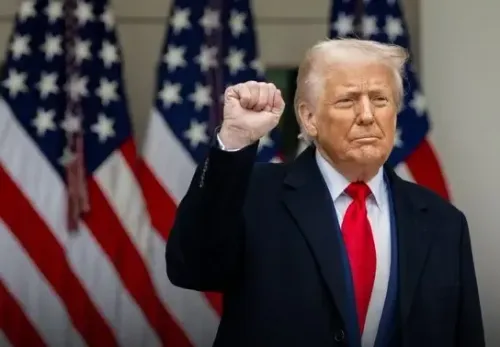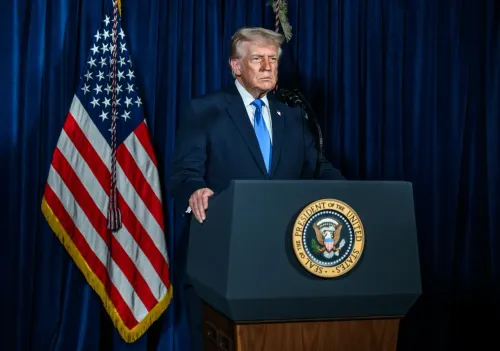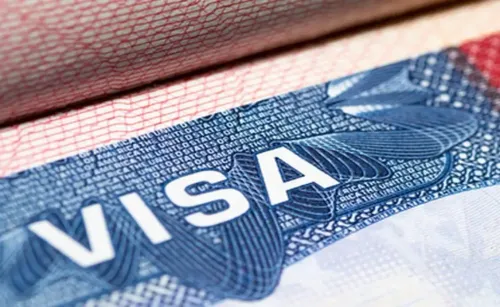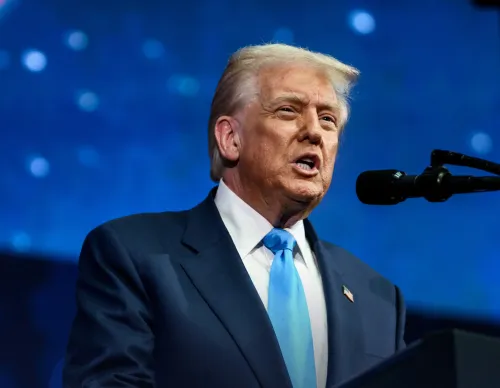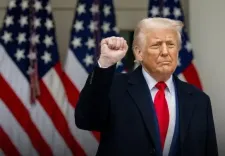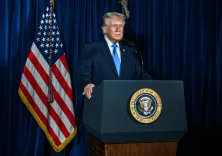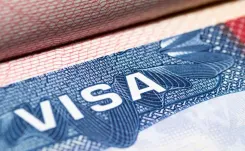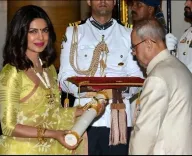Could Ukraine's Zelensky End the War with Russia Almost Immediately?
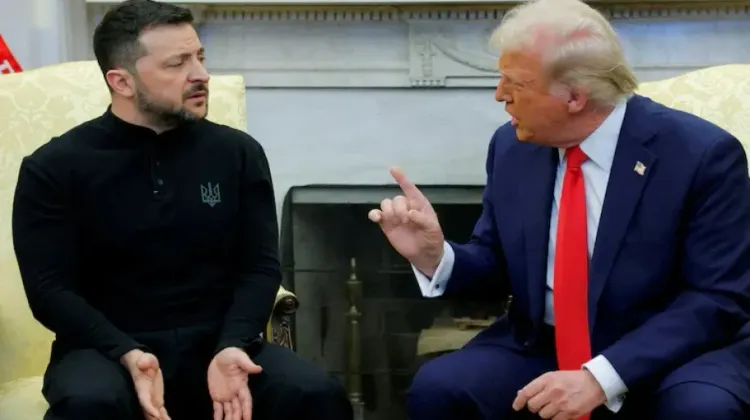
Synopsis
Key Takeaways
- Trump claims Zelensky can end the war immediately.
- Conditions for peace include ceding Crimea and avoiding NATO.
- European leaders express concerns over the negotiations.
- Ongoing conflict leads to humanitarian impacts in Ukraine.
- Security guarantees from the US are considered crucial.
Washington, Aug 18 (NationPress) Former President Donald Trump has suggested that Ukrainian President Volodymyr Zelensky could choose to conclude the ongoing conflict with Russia "almost immediately". However, he emphasized that reclaiming Crimea, which is currently under Russian occupation, or pursuing NATO membership, are not viable options.
"If President Zelensky of Ukraine desires to end the war with Russia, he can do so at once, or he may opt to persist in the struggle," Trump stated on his Truth Social account on Sunday.
"There’s no bringing back Obama’s actions regarding Crimea (12 years ago, without a shot being fired!)... and NATO membership for Ukraine is a definite NO. Some things remain unchanged!"
As pivotal discussions loom with Zelensky and a significant group of European leaders, Trump previewed his message: Zelensky must concede to certain Russian demands for the conflict in Ukraine to cease.
This message highlights the pressures Zelensky faces as Trump aims to resolve the situation. The two demands Trump mentioned — Ukraine surrendering Crimea, which Russia unlawfully annexed in 2014, and agreeing to never join NATO — are among the prerequisites set by Russian President Vladimir Putin for a resolution of the war.
European leaders accompanying Zelensky to the White House on Monday are apprehensive that the meeting will result in Trump applying pressure on the Ukrainian leader to accept the conditions presented by Putin during their recent summit in Alaska.
They are eager to learn more from Trump regarding potential concessions from Russia as part of a peace agreement, including the US's role in providing future security guarantees.
"A significant day at the White House tomorrow. Never before have I hosted so many European leaders simultaneously. It’s a great honor!" Trump remarked following his communication to Zelensky.
The European team includes French President Emmanuel Macron, German Chancellor Friedrich Merz, British Prime Minister Keir Starmer, Italian Prime Minister Giorgia Meloni, European Commission President Ursula von der Leyen, Finland President Alexander Stubb, and NATO Secretary General Mark Rutte, all joining Zelensky for the White House visit.
Trump met with Putin in Alaska on Friday, but the discussions did not result in any significant progress toward a ceasefire, although White House envoy Steve Witkoff stated that both leaders had agreed to establish "robust security guarantees" for Ukraine.
European Commission Chief Ursula von der Leyen praised this development, but Zelensky, at a joint press conference in Brussels, dismissed the notion of Russia providing security assurances to his country.
"What President Trump articulated regarding security guarantees is far more significant to me than what Putin has to say, as Putin will not offer any security assurances," he stated.
Zelensky later shared on social media that the US's offer of security guarantees was "historic".
President Macron, who is set to participate in the Washington discussions alongside von der Leyen and others, indicated that European leaders would inquire about the scope of security guarantees extended to Ukraine in any peace agreement.
Macron remarked on Moscow’s stance: "Only one nation is proposing a peace that amounts to capitulation: Russia."
In response, Russian Foreign Ministry spokeswoman Maria Zakharova labeled this assertion as an "abject lie" in a statement on Telegram later on Sunday.
She noted that Moscow had been advocating for a "peaceful resolution" of the conflict for seven years under the Minsk Accords. Macron, she added, is attempting to persuade Ukraine that victory on the battlefield is feasible, even when he knows it is "impossible".
After the Alaska meeting, Trump shifted his focus to pursuing a peace deal rather than merely a ceasefire, posting on Truth Social, "BIG PROGRESS ON RUSSIA. STAY TUNED!" without further details.
This newfound emphasis on a peace deal aligns with Putin's long-held stance, which Ukraine and its European allies have criticized as a tactic to gain time while making military advancements.
Zelensky also expressed that he detected "no sign" that the Kremlin leader was willing to engage in a three-way summit with him and Trump, as previously suggested by the US President.
The leaders arriving in Washington on Monday to appear alongside Zelensky refer to themselves as the "coalition of the willing".
On Sunday, all European leaders conducted a video conference to solidify their unified position.
In an interview with CNN, Witkoff expressed hope for a productive meeting on Monday, aiming for a genuine consensus that would allow them to approach Russia and advance this peace initiative.
US Secretary of State Marco Rubio, speaking to NBC on Sunday, warned of potential "consequences" — including the likelihood of new sanctions on Russia — if an agreement on peace in Ukraine is not reached.
From the outset, European leaders have voiced concern over Trump’s outreach to Putin, who has insisted that Ukraine relinquish its aspirations to join the EU or NATO. They were excluded from Trump’s summit with Putin.
Witkoff, during his CNN appearance, indicated that the process of offering "game-changing" security guarantees would necessitate territorial "concessions".
As per an official briefed on a call Trump had with Zelensky and European leaders while returning from Alaska, the US leader supported a proposal from Putin for Russia to gain total control over two eastern Ukrainian regions in return for freezing the frontline in two others.
Putin "de facto demands that Ukraine abandon Donbas," which encompasses the Donetsk and Lugansk regions in eastern Ukraine, only partially controlled by Russia, according to the source.
In return, Russian forces would cease their offensive in the Black Sea port region of Kherson and Zaporizhzhia in southern Ukraine, where the primary cities remain under Ukrainian control.
Several months into its large-scale invasion of Ukraine, Russia claimed in September 2022 to have annexed all four Ukrainian regions, despite its troops not fully controlling any of them.
Amidst the ongoing conflict, both Kyiv and Moscow continue to deploy attack drones against each other. Ukrainian officials reported early Monday that 13 individuals were injured in Russian strikes on Kharkiv and the Sumy region.


